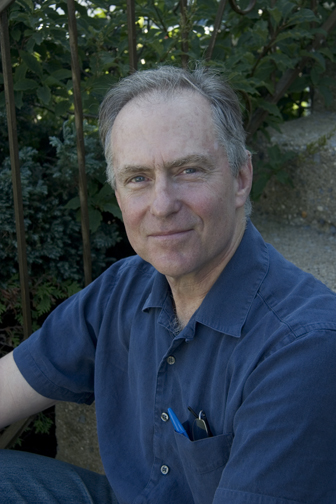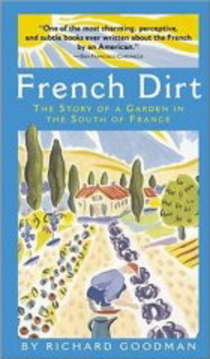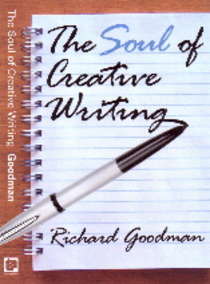Interview with Richard Goodman by Katerina Stoykova-Klemer
Richard Goodman is the author of The Soul of Creative Writing and French Dirt: The Story of a Garden in the South of France. He has written on a variety of subjects for many national publications, including the New York Times, Harvard Review, Creative Nonfiction, Commonweal, Vanity Fair, Garden Design, Grand Tour, The Writer’s Chronicle, The Louisville Review, Saveur, Ascent, French Review, and the Michigan Quarterly Review.
He is a winner of a Hopwood Award for his fiction. He created, wrote and narrated a six-part series about New York City for Public Radio in Virginia. His essay, “In Search of the Exact Word,” appears in the Oxford American Writer’s Thesaurus. He wrote the introduction for Travelers’ Tales Provence. Richard Goodman is the Fine Presses Editor for Fine Books & Collections Magazine, for which he writes a regular column. He has taught writing in New York for many years, and was a founding member of the New York Writers Workshop. He teaches Creative Nonfiction at Spalding University’s Brief Residency MFA in Writing Program in Louisville, Kentucky. Richard Goodman travels widely conducting workshops on writing around the country.
You are best known for you works of creative non fiction (CNF). Could you give the readers of Public Republic your definition of what CNF is?
I think of creative nonfiction—I guess as opposed to just nonfiction—as prose that uses all the most powerful techniques of fiction in a memorable, creative way. Although there are differences between the two genres, of course, both, broadly speaking, ultimately seek to tell a story. It’s the how that determines in nonfiction if it’s creative or not, at least in my opinion. So I look for creative nonfiction in which, for example, the writer has taken pains to create a strong setting; has believable, vivid and engaging characters; writes measured and musical sentences; and searches relentlessly for the exact word. I look for nonfiction in which the author is brave and compassionate, not just confessional. Actually, I think in creative nonfiction the subject is the least important thing about it. It’s the writing that counts. That’s why I turn again and again to a book like The Woman Warrior by Maxine Hong Kingston, one of the first memoirs, and, to my mind, still one of the best, if not the best. You can go to CNF school on that book alone.
What does the CNF genre give to you that you cannot find in fiction or poetry?
Well, poetry is a different beast altogether. I can’t speak so well to what CNF gives you that poetry can’t. I don’t really think you choose between the two, or should, actually. What CNF can give you that fiction can’t is the idea that what you are reading about actually happened. I’m going to be incredibly shameless here and crib from my own book, because I can’t say it any better—however good that is, or isn’t—than I do there. A good part of our astonishment at reading Ernest Shackleton’s account of his eight-hundred-mile open boat voyage from Elephant Island across the terrible frigid sea to South Georgia Island, for example, is that real men went through this, with real fears and real hopes, who had real families at home and real men left behind cold and hungry depending on their success. This happened. This is part of what makes the book, Alive: The Story of the Andes Survivors, so strong, as well.
The story of an airplane crashing in the Andes and the survivors resorting to eating the flesh of their dead comrades in order to survive moves us deeply. Real people, not so unlike us, went through that experience. Who is to say that one day something like that might happen to one of us? We wonder how we might act. If this were in a novel, we might easily dismiss it, and it probably wouldn’t plague our hearts and minds with sympathy and horror in so intimate a way as it does in Alive. I’m not speaking of truth here. That’s different. Both genres aim for that. I’m speaking of the link CNF provides between the people on the page and us.
Who are your top three favorite non fiction writers and what have you learned from each?
This is too big a question! I honestly can’t pick my three favorites. I can’t because there are so many different kinds of nonfiction writers. I think of Hunter Thompson as a writer of CNF, though I’ll bet if he were still around, he’d scoff at that. Or rant. But his writing is electric. It’s funny and courageous and has tremendous energy. All the while coming from a fiercely honest and very smart mind. I love reading his books. But he’s very different than Maxine Hong Kingston! Yet, I’d put them both in that favorite CNF boat of mine. What do they have in common? I’m not sure I know. So, I’m going to weasel myself out of this, with an explanation.
How/Why did you decide to write The Soul of Creative Writing?
Well, I really didn’t decide to write it. The idea came to me after I’d given some lectures at Spalding on writing. We’re required to give a lecture there every semester. I took particular pains to do a good job, because, at the time, I only had one book to my name. I always wrote out the complete lecture, didn’t just use notes. After I gave the first one, I thought, well maybe I can get this published. So I sent it in to the AWP’s Writer’s Chronicle, and they took it. I published two more there. (I’ve just had a fourth accepted, but that isn’t in the book.) At that point a friend said, I think you might have a book here. I thought, maybe he’s right. So, I wrote the rest of the essays on my own and sent the manuscript out. Fortunately, someone said yes.
I have heard you say that a writer should listen to his or her obsessions. Where have your obsessions taken you over the years?
I’m particularly struck by what the poet W.S. Merwin said once: “Writers pray to be obsessed by something.” So true! I think there’s a big difference between being obsessed by something and, say, being fascinated by something. Obsession comes to you and grabs you by the scruff of the neck and says, you stay with me; give all your blood, sweat and tears to me. It doesn’t happen that often. And I don’t think you ever really know why or how it does. That’s why Merwin says writers pray for it. But you can deny an obsession. You can ignore it for whatever reason. So I tell students never, ever do that. Heed it. Regardless.
But I think maybe what I meant by that when I said it was something less potent but still very important. That is, if you are engaged by something, if it resonates with you, then write about it. No matter what it is. I think one of the problems all writers face to some degree is: is what I want to write about important enough? The answer is, if it is to you. Because passion drives a story and creates good writing. Marianne Moore said that “if emotion is strong enough, the words are unambiguous.” So, if you love and are fascinated by maple syrup, or subways or curling, write about it.
You have traveled through Europe. Could you please tell the readers of Public Republic about the time you spent in Bulgaria?
That was a long time ago! 1970. I don’t even like to think about how many years have gone by. Well, never mind. The first thing I want to say is that I had a great time in Bulgaria. I was a young guy traveling with a great friend of mine, and we had the ultimate luxury: time. We were able to spend a lot of time in each of the countries we visited. Bulgaria was still very communist then, a long way from what it is now. And this was during the height of the Vietnam War. Our countries’ two ideologies were directly, fiercely opposed to one another.
I remember someone told us that Bulgaria was even more communist than Russia. So, we entered from Yugoslavia not a little worried. We went to Sofia first. Now, that place was something to see. It just seemed so cheerless to me. We didn’t stay there long. We took a train to Burgas and then went up to Nesebūr on the Black Sea. Beautiful place! We stayed there for two weeks and had the time of our lives. Everyone we met was wonderful to us. Not one person brought up Vietnam or Nixon or capitalism. We met all sorts of people, young and old. We went to the beach every day. We ate well, and cheaply. We laughed. We had a ball.
I learned something on that trip to Bulgaria. I learned that what my government had been telling me about those communist countries, that they all wanted to take us over and put us under their system, was not true. It certainly wasn’t true for the ordinary man and woman. One other thing. I remember seeing some Bulgarian folk dancing and singing one evening. I guess some of our Bulgarian friends said we should go. It didn’t sound like the world’s most exciting time, but I was blown away. They were amazing! I had never heard anything like this before. It was wonderful, because even though I couldn’t understand a word of anything they were singing, I was moved and thrilled by the singing.














5 comments so far ↓
Nobody has commented yet. Be the first!
Comment